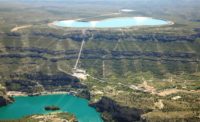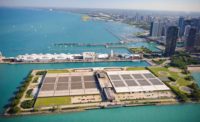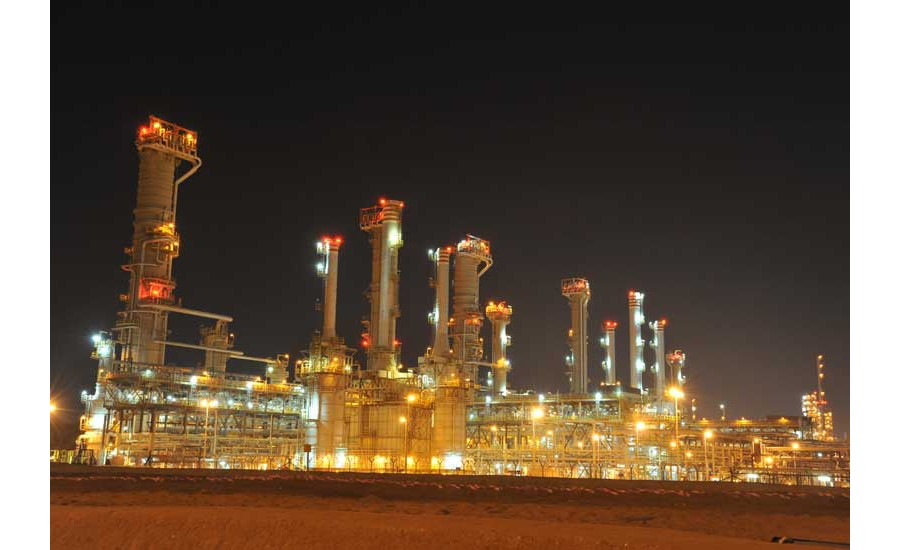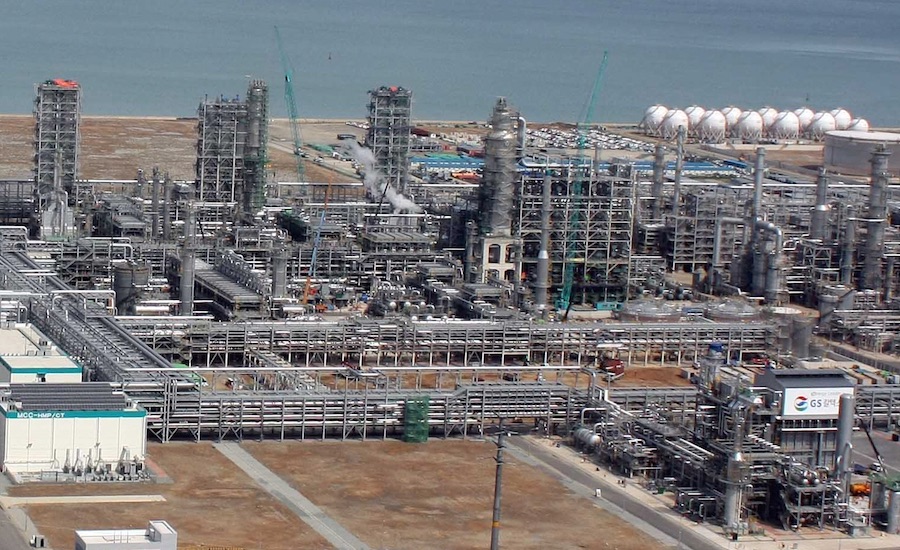The 10 Largest-Capacity Refineries in the World

No. 1. Jamnagar Refinery, India; capacity: 1,240,000 barrels per day. Reliance Petroleum Ltd. completed construction of its original refinery, with a capacity of 660,000 barrels per day, at this site in Gujarat, on India’s west coast, in 1999. Under pressure to meet a 20-month engineering schedule, Bechtel used resources in New Dehli, London, Houston and Paris to complete more than 80,000 engineering drawings and procurement work. Bechtel led the construction team, which included Indian firms Larsen & Toubro, Dodsal, Punj Lloyd, Trafalgar House and Simplex. While construction was underway in 1998, the site was hit by a major cyclone, which caused damage but injured few workers. The construction cost of the original refinery was $5.4 billion. Reliance launched a major expansion to the refinery in 2005. Also led by Bechtel, the construction team built a 580,000-barrels-per-day, export-focused refinery to process heavier crude. The expansion required 165,000 tonnes of concrete, 138,000 tonnes of structural steel and 4 million meters of piping. The workforce peaked at 80,000. Given a shortage of skilled construction workers, Reliance set up an on-site training facility, training 8,000 welders, 5,000 carpenters and 5,000 pipefitters. Due to the remoteness of the site, thousands of apartments had to be built to accommodate the workers on a 250-acre plot, adjacent to the refinery site. The refinery produces liquefied petroleum gas, propylene, naphtha, reformate, gasoline, TAME, jet fuel, high-speed diesel, sulphur and petroleum coke. Significant quantities of its output are exported to customers in Asia, Australia, the Middle East, Europe, South America and the U.S.
Photo Courtesy Bechtel

No. 2. Paraguana Refinery Complex, Venezuela; capacity: 955,000 barrels per day. The Paraguana Refinery Complex was formed by the fusion of three refineries. The Cardón Refinery began operating in 1949, with a capacity of refining 30,000 barrels per day. Subsequent expansions increased its capacity to 305,000 bpd. It was owned by Royal Dutch Shell. Creole Petroleum in 1950 built the adjacent Amuay Refinery, which refined 60,000 bpd, with subsequent capacity expanded to 645,000 bpd. The Bajo Grande Refinery, built in 1956 by Richmond (later Chevron), has a capacity of 16,000 bpd. Cardon and Amuay are located on the Paraguana Peninsula, while Bajo Grande is located on the western coast of Lake Maracaibo. All three refineries were absorbed by Petroleos de Venezuela (PDVSA), the state-owned company, in 1976, when Venezuela nationalized all foreign-owned petroleum industry assets. A gas leak at the Amuay refinery in August 2012 caused an explosion, setting three storage tanks on fire, killing 48 people and damaging 1,600 homes.
Photo courtesy of inelectra

No. 3. Ulsan Refinery, South Korea; capacity: 850,000 barrels per day. Yukong Ltd. employed Fluor to build its first oil refinery, with a capacity of 35,000 bpd in 1964. While Yukong Ltd. subsequently changed its name to SK Energy Co. Ltd., the plant's later expansions increased its capacity to 610,000 bpd by 1997, making it the world’s largest refinery at that time. Due to more expansions, the plant's current capacity tops out at 850,000 bpd, much of which is exported. The refinery has five crude distillation units and a paraxylene unit that has a capacity of 758,000 tonnes per year. Further, it has two naphtha cracking units and a heavy-oil upgrading facility, which has a capacity of 114,000 bpd.

No. 4. Ruwais Refinery, United Arab Emirates; capacity: 817,000 barrels per day. The Abu Dhabi National Oil Co. (ADNOC) completed construction of its original refinery, with a capacity of 120,000 bpd, at Ruwais in 1982, giving it downstream capability for the first time. A major expansion was carried out by Snamprogetti, bringing the capacity to 280,000 bpd by 2000. The Abu Dhabi Oil Refining Co. (also known as Takreer) was established in 1999 as a public joint-stock company to take over the responsibility of refining operations previously undertaken by ADNOC. After reaching a capacity of 400,000 bpd, Takreer embarked on a major expansion, more than doubling capacity, to 817,000 bpd. Beginning in 2010 and completed in 2015, construction was carried out by four Korean firms: SK Engineering and Construction, GS Engineering and Construction, Samsung Engineering, and Daewoo Engineering and Construction, each handling separate portions on an engineer-procure-construct-commission basis. This $9.6 billion expansion included the addition of crude distillation and sulphur recovery units, a residue fluidized catalytic cracker and a carbon black delayed coker unit. The new refinery unit enabled the production of 1.1 million tonnes of propylene per year through integration with nearby petrochemical complexes. Propylene is supplied as feedstock to the Borouge Olefins complex, adjacent to the refinery. Currently, the refinery produces a wide range of refined products, including liquefied petroleum gas, premium unleaded gasoline, special unleaded gasoline, naphtha grades, jet-A1 and kerosene grades, gas-oil grades, straight-run residue, bunker fuel and granulated sulphur. Its marine terminal accommodates tankers of up to 330,000 dead-weight tonnes.

No. 5. Yeosu Refinery, South Korea; capacity: 730,000 barrels per day. GS Caltex, a 50-50 partnership of Chevron Corp. and GS Holdings, completed construction of its original 60,000-bpd refinery in 1969. By 1981, four additional expansion projects increased the refinery’s capacity to 380,000 bpd. Construction of the No. 4 crude distillation unit, with a capacity of 270,000 bpd, increased the refinery’s total capacity to 650,000 in 1996. A second heavy-oil upgrading facility was built in 2007, at a cost of $1.5 billion. The refinery includes a hydrocracker, a base oil plant and heavy-oil upgrading facilities, to convert inexpensive residue into expensive light-petroleum products, such as kerosene and diesel.
Photo courtesy GS Caltex

No. 6. Onsan Refinery, South Korea; capacity: 669,000 barrels per day. S-Oil’s original crude distillation unit, with a capacity of 90,000 bpd, began operating in 1980. Two major expansions, in 1991 and 1995, resulted in the plant's present capacity. Beginning in 1996, the refinery added its Bunker-C Cracking Center, which produces value-added light-oil products, such as gasoline, diesel and kerosene. In addition, the refinery produces benzene, toluene xylene and paraxylene. The refinery is currently in the midst of two major upgrading projects. In 2015, S-Oil awarded contracts to Axens and a consortium of Daelim Industrial Co. Ltd. and Daewoo Engineering & Construction Co. to build a residue upgrading complex and olefin downstream complex. The residue upgrading complex will produce gasoline, alkylate and methyl tertiary ether. The olefin downstream complex will produce polypropylene and propylene oxide. Both projects are expected to be completed during the first half of 2018.
Photo courtesy S-Oil

No. 7. Port Arthur Refinery, Port Arthur, Texas; capacity: 600,250 barrels per day. The first processing units of the Port Arthur Refinery were built in 1902 by a forerunner of Texaco to process the yield of the nearby Spindletop field. In 1989, Saudi Refining, a business unit of Saudi Aramco, purchased from Texaco 50 percent of the Port Arthur Refinery. Texaco later was absorbed by Chevron; in 2002, Chevron sold its share of the refinery to Shell. The joint venture operating the refinery was named Motiva Enterprises LLC. The complex has access to numerous crude-oil and product pipelines, which transport gasoline, diesel, kerosene and jet fuel to the East Coast, Midwest, and central and southeastern Texas. The refinery also operates the largest single lubricant plant in the U.S.; it produces lubricant base oils that are sold to Shell Lubricants and various other industrial clients. The refinery more than doubled in capacity, to its present size from 285,000 bpd, during a huge expansion effort that lasted from 2007 to 2012. Construction involved 325,000 cu yd of concrete and 156 million lb of structural steel and required driving 62,776 foundation piles to support structures. If the delayed Keystone XL pipeline is built, the $10-billion expansion gives the plant the capability to run lower-cost heavy oil from South America and, potentially, Canada.

No. 8. Singapore Refinery, Singapore; capacity: 592,000 barrels per day. The ExxonMobil Singapore Refinery consists of two separate operations: One plant, located at Jurong on the Singapore mainland, has a processing capacity of 302,000 bpd; the other plant, sited at Pulau Ayer Chawan on Jurong Island, has a capacity of 290,000 bpd. The Jurong complex began operations in 1966, and the Pulau Ayer Chawan complex started in 1970. The refinery’s downstream units include a steam cracker ethylene complex and a chemical plant with two world-scale steam crackers, as well as an aromatics plant. In February 2017, ExxonMobil announced that it plans to expand production of high-quality lubricant base stocks at the facility. Construction will begin during the second quarter of 2017 and be completed in 2019.

No. 9. Baytown Refinery, Baytown, Texas; capacity: 560,000 barrels per day. Humble Oil first opened a refinery on this site in 1919. Currently occupying 3,400 acres adjacent to the Houston Ship Channel, the refinery has 3,400 direct employees and 3,900 contract personnel. The majority of crude oil for the refinery is supplied by tankers from the Persian Gulf, Africa, South American and Mexico, along with pipeline crude from Texas and Louisiana. Gasoline is supplied to Texas and the East Coast via pipeline. The refinery also produces lube oil, waxes and other specialized hydrocarbon fluids. The affiliated petrochemical plant purifies refinery propylene and recovers aromatics from refinery reformate and naphthas, as well as butylene for butene-1 production. ExxonMobil Chemical Co. launched a major expansion in 2014, constructing a multibillion-dollar ethane cracker that provides ethylene feedstock for downstream chemical processing at two new high-performance polyethylene lines at the company’s Mont Belvieu plastics plant. The project workforce peaked at about 10,000. Linde Engineering North America Inc. and Bechtel Oil, Gas, and Chemicals Inc. were hired to build the olefins recovery units. Mitsui Engineering & Shipbuilding Co. Ltd. and Huertey Petrochem S.A. were hired to build the new olefins furnaces. The construction cost of the expansion was $6 billion.

No. 10. Ras Tanura Refinery, Saudi Arabia; capacity: 550,000 barrels per day. Construction of the original refinery at Ras Tanura, on the Persian Gulf, was sparked by wartime demands that were draining U.S. oil fields. But the war ended before the refinery could be completed. It began operating in late 1945, having a capacity of 60,000 bpd and producing bunker fuel for ships, diesel oil for trucks and railroad engines, and fuel oil for industrial use, as well as kerosene, auto gasoline and aviation gasoline. By 1962, its capacity was expanded to 210,000 bpd. A 130,000-bpd, natural-gas liquids fractionation plant was added in 1978. An $8 billion major expansion was undertaken between 2007 and 2012. WorleyParsons provided front-end engineering and design as well as project management. The expansion included a crude distillation unit, with a capacity of 400 million bpd; a vacuum distillation unit; a continuous catalyst regenerator and a visbreaker crude unit. Owner Saudi Aramco in December 2016 awarded a $1.5-billion contract to Tecnicas Reunidas to build a clean-fuels unit, which will enable the refinery to supply export markets with stricter environmental mandates.










Refinery construction is primarily driven by demand for oil products. "Demand growth for oil products is currently strong and will remain so for at least this year and next," says Richard Joswick, managing director of PIRA Oil Group at Platts. "Over the medium term, although we think it will slow somewhat, it will still remain quite healthy. We do not see any 'peak demand' for oil any time soon."
"Global refined-product demand is expected to grow by about one million barrels per day per year for the next decade, and that growth will require refinery capacity expansion," says Rebecca Adler, senior director of communications at the American Fuel and Petrochemical Manufacturers.
"There's a need, long term, for new refineries globally," adds Joswick. "We've seen a lot of refinery growth in rapidly developing countries—in the Middle East, India and China. We’ve seen incremental growth in the U.S., where there are de-bottlenecking projects, because demand is still growing. Refinery margins were very good in 2015, good in 2016 and are good now.”
A similar perspective is provided by Jacobs, which does extensive, ongoing refinery work for major clients. “We expect the best markets for refineries to be in non-OECD [Organisation for Economic Co-operation and Development] countries, specifically those in Southeast Asia, as they move away from imports and toward self-reliance in transport fuels,” says Shaun Boardman, vice president of technology at Jacobs Petroleum & Chemicals.
Joswick sketched out the cyclical nature of the refinery market, with its high cost of entry, high capital costs and long lead times. "We're now in a place where refinery capacity growth has come down. Growth in 2017, 2018 and 2019 will be less than in the past five years, since margins were poor when these current projects were commissioned. There are good margins now," he says. "I expect we'll see a construction surge starting in 2019. Refineries are always five years behind the times because it takes five years to go from concept to planning to design to permitting to construction and startup to commercial operation."
Another factor influencing refinery construction is an upcoming global specification change for bunker fuel, which takes effect on Jan. 1, 2020. The global sulfur cap of 0.5% was promulgated by MARPOL Annex VI, an international marine-pollution convention. Representing over 90% of global trade, 88 countries have agreed to the cap. “Three million barrels per day of refinery output of bunker fuel will have to switch from high sulfur to low sulfur,” explains Joswick. "There’s no easy way to do that—only expensive ways. Refiners that have coking capacity will make a huge amount of money. Other refiners will hurt. This will cause a scramble for the kinds of units that will produce low-sulfur bunker fuels—coking and hydrocracking units. I would expect to see a spurt in construction to meet that demand."
The Al Zour Refinery, in Kuwait, is the largest greenfield refinery being built anywhere in the world; it is expected to have a capacity of 615,000 barrels per day. The estimated construction cost is $16 billion, and it will more than double the country’s processing capacity when completed in 2019. So far, the Kuwait National Petroleum Co. has awarded $12.8 billion in five packages.
The first contract, worth $4.2 billion, was awarded to Technicas, Hanwha Engineering & Construction Corp. and China Petroleum & Chemical Corp., known as Sinopec. The second and third packages, worth $5.7 billion, were awarded to Fluor Corp., Daewoo and Hyundai Heavy Industries Co. According to Fluor's Jim Brittain, the joint venture they are leading on those two packages "is using a modular execution approach, with peak labor on site expected to be around 17,000 people."
The fourth package, worth $1.55 billion, was given to Saipem SpA and Essar Oil Ltd., and the fifth package, worth $1.48 billion, was awarded to Hyundai Engineering & Construction Co., Saipem and SK Holdings Co. Ltd. It will process heavy crude from Kuwait into low-sulfur diesel, high-value light products and fuel oil to feed power plants within Kuwait.
Nigeria is taking a huge economic leap, as the large cement manufacturer Dangote Group is developing a $12-billion greenfield refinery, near Lagos. Engineers India Ltd. is performing engineering, procurement and construction management for the refinery and an associated polypropylene plant. The project will include a crude distillation unit, a single-train residual fluid catalytic cracking unit and a diesel hydrotreating unit. When the plant begins operating in 2019, it will have a capacity of 650,000 bpd.
The Sturgeon Refinery is the largest refinery construction project underway in North America. For the first refinery built in Canada in 30 years, construction involves 7,500 workers at a site 45 kilometers northeast of Edmonton, Canada. Estimated to cost $8.5 billion and expected to begin operations in late 2017, Sturgeon's first phase will process 79,000 bpd of bitumen and diluent blend. The North West Redwater Partnership, a 50-50 alliance between MacGregor’s North West Refining and Canadian Natural Resources Ltd., is the owner and operator. Fluor is responsible for three units on the project. "We have been involved in the project since the front-end engineering and design phase in 2011 and have applied a number of construction innovations on the project, including an integrated scaffolding program that has been recognized by Fiatech for its improvement to project planning and innovation,” says Jim Brittain, group president of energy and chemicals at Fluor.
"Modularization has proved to be a key part of achieving cost and schedule certainty," says Brittain. "Project work is moved offsite to fabrication yards, where components are assembled and then shipped to site. It reduces on-site labor and congestion, improves safety [through a reduced need to work at heights] and moves work to a more productive environment." He adds, "While modularization has been used in Canada and other countries for many years, we are now applying it to other locations because of the predictability it brings, including both the Sturgeon Refinery project in Canada and on the Al-Zour Refinery in Kuwait. We have close to 200 modules on the Al-Zour project and 358 on the Sturgeon Refinery project."
Given the huge scale of refinery projects, contractors are seeking new approaches to improve execution. "Unlike the traditional approach to construction, we engage our construction teams in the early stages of a project, during front-end engineering and design, to ensure work packages are developed with construction in mind," says Boardman. "Through our construction-readiness reviews, we review what is needed early and begin working deliverables, including commissioning and turnover plans, and so on. We also help engineering with sequencing. This benefits our clients by improving productivity during construction, reducing schedule and maximizing return on investment."
Boardman continues, "Another key element to overcoming the planning and scheduling challenge is project oversight. A project team is inherently optimistic, including the customer. We provide independent oversight throughout the life of a project, which includes reviewing and discussing the realities of indicators and issues as well as how to overcome these challenges."
Reduced capital spending has spurred contractors to devise creative solutions. "Refinery owners across the globe are faced with the reality of reduced capital expenditure budgets, so they are adapting, learning and collaborating in order to do more with less," says Mark Ashwin, regional operations manager for Bechtel’s downstream and chemicals business line. "Our integration across functions throughout project development enables us to efficiently innovate across the entire EPC value chain.
"For example, in Indonesia, we are working with Pertamina to enhance their project management capacity and develop procedures and methods to improve the efficiency of project development and execution," Ashwin notes. "It's a very interesting process of sharing, comparing and combining our respective EPC experiences.
"On the construction side, major challenges we see on our downstream and petrochemicals projects across the globe are primarily an increase in complexity that leads to challenges with construction productivity as well as availability of qualified craft," Ashwin observes.
A proposed South Texas oil refinery is expected to break new ground in terms of its environmental impact. It will be colocated with a geothermal power plant, a brine desalination plant and carbon capture and sequestration to create what the developer-owner is describing as the cleanest refinery in the world.
Renewable geothermal energy will power the refinery. Early cycles of geothermal power will be generated using high-temperature brackish water, while later cycles will rely on the refinery's own carbon-dioxide emissions for power. Captured and pumped deep underground, the pressure and heat will make those emissions supercritical, then they will be drawn back up to drive the geothermal power plant’s turbines.
Owner Raven Petroleum LLC, The Woodlands, Texas, has signed memoranda of understanding with Thermal Energy Partners LLC, Austin, and Basic Equipment, Houston, to build the South Texas Energy Complex, near Hebbronville. The refinery will process up to 55,000 barrels per day of Eagle Ford shale oil for Raven, producing gasoline and low-sulfur diesel. Thermal Energy will design and construct a geothermal power plant with a capacity of up to 20 MW to power the refinery. Basic Equipment will perform engineering, procurement and construction for the refinery and construction management for the complex.
With the geothermal plant fully integrated, the total cost of the project will be about $500 million, says Christopher Moore, Raven's managing director. Engineering design is expected to be completed by June 2017, followed by permitting; construction is expected to begin sometime in 2018.














